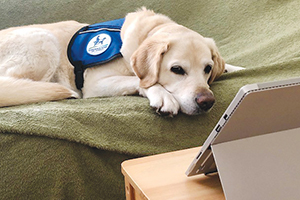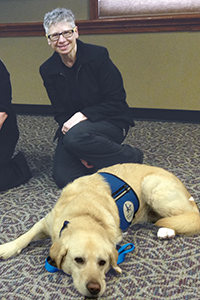An unlikely hero got a lot of the credit three years ago when a pair of siblings, aged 9 and 11, gained the inner strength to face in court an abuser who had inflicted horrific harm on them. Reassured by the trusted presence of Astro, a courthouse facility dog, the two provided the testimonies needed to achieve a favorable outcome in court.
That is according to Dr. Joyce Gilbert, medical director of the Sexual Assault Clinic and Child Maltreatment Center, a free-standing medical clinic in Lacey, Washington, that is associated with Providence St. Peter Hospital.

She says that the younger sibling especially experienced severe anxiety as the court date had neared. But the care team had prepared thoroughly with the child and Astro. Once in the courtroom, with the dog at his feet, the child "got on the stand and held Astro's leash and disclosed more information in court than he had at any other point in the process," Gilbert says.
Astro has soothed victims and caregivers in big and small ways since 2014, when he arrived at the center and at its partner facility, the Monarch Children's Justice and Advocacy Center. The 8-year-old Labrador-golden retriever mix was bred for his calm traits and obedience and specially trained to provide a comforting presence to children who have suffered trauma, and to the loved ones and staff who are helping them recover.
"He takes care of everybody," Gilbert says. "He is a blessing."
Tambra Donohue, a clinical psychologist who directs the Monarch center, says Astro "has transformed our work." The Monarch building, where Astro does the bulk of his work, provides a central location for preventing, investigating, prosecuting and treating child abuse in Thurston County, Washington.
Daunting process
Monarch staff coordinate the involvement of organizations that respond when a child, adolescent, or adult is sexually or physically abused, neglected, a witness to violence or trafficked. Most of its clients are children.

The centralized services include advocacy, case management, multi-disciplinary coordination, mental health and child forensic interviews and medical services. The sexual assault clinic run by Providence St. Peter is one of the providers, and it is located at the Monarch center.
When social services, law enforcement, medical providers or others learn of a potential case of child abuse, they can refer the child's family to the Monarch and Providence centers. Providence center physicians, nurse practitioners and nurses specialized in sexual assault response conduct forensic medical evaluations of the child, and Providence center social workers provide crisis counseling for the victim and family.
Together, the Monarch and Providence centers then coordinate the process of conducting further forensic investigation and providing mental health therapy. When criminal charges are being pursued, the centers together support the child victim during depositions and court testimony. The centers provide follow-up care, treatment and support to the child.
The idea to add a courthouse facility dog to the care team was first proposed by Dr. Deborah Hall, who retired as medical director of the sexual assault clinic. She engaged the Courthouse Dogs Foundation of Bellevue, Washington, to help her introduce the concept to professionals engaged in child abuse cases in Lacey. At the time, fewer than 50 such dogs were at work in 20 states. Today there are 255 courthouse dogs working in 41 states, according to the Courthouse Dogs Foundation.
Well trained
Astro is a graduate of Assistance Dogs of Hawaii, a nonprofit that trains service dogs for specific tasks. That organization raises funds to provide the dogs free of charge to the organizations where they are placed. Assistance Dogs of Hawaii placed Astro with Monarch. Donohue traveled to Hawaii to live for a week with Astro and to learn how to be his primary handler. Since his arrival in Lacey, four more staffers of the Monarch and Providence centers have received training — 12 hours apiece — to serve as secondary handlers. They can work with Astro in cases in which Donohue is not legally permitted to be in the room with a child, for confidentiality reasons. Astro and his primary handler were certified by Assistance Dogs International and are recertified every year by Assistance Dogs of Hawaii.
Donohue says Astro knows more than 90 commands relevant to helping traumatized children, including commands to snuggle or to lay next to them. He is near to children as they undertake the emotionally fraught process of being examined, interviewed and put on the witness stand. And, the handlers can engage the children in interacting with Astro, so that they gain confidence and control. For instance, the children can help "train" Astro to retrieve items.
"Every aspect of interacting with Astro is soothing and positive for the child," Gilbert says.
Studies have shown that exposure to, and bonding with, animals helps traumatized children. Gilbert says, "The children come in scared. They've made some disclosure, and now they're not sure what will happen next. When Astro comes, their heart rates go down, they're breathing more normally, they're thinking more clearly," and they can move forward with the difficult tasks they'll have to do at the centers.
Donohue adds that "families come in very stressed, and when they see their child relaxing and engaging with Astro," they begin to relax themselves.
The staff members of the centers and partnering organizations — who also are affected by ongoing exposure to trauma —turn to Astro for comfort too, Gilbert says.
Celebrity status
Gilbert estimates that before the pandemic, Astro interacted with upwards of 100 people each week, including greeting those throughout the centers; supporting victims in intensive medical examinations, interviews and therapy sessions; and being present for emotionally stretched staff. The clinic was closed for two months as part of coronavirus-related shutdowns but has since reopened and resumed its services, including visits from Astro. Staff have put in place infection control procedures, such as disinfecting his vest between visits.
Donohue notes that Astro has been performing his job at Monarch via telehealth in limited cases during the pandemic. She says he learned very quickly how to interact with children on the computer screen and to respond to them.
Donohue calls Astro "a community-level intervention," because he serves as an ambassador to so many people. The centers hand out trading cards and bracelets with Astro's picture on them — and these novelties can function as what Donohue terms "transitional comfort items" that children can carry with them when they leave the centers. She says Astro is a central figure at the centers — children draw pictures of him and there are photos of him all over the centers.
"It's amazing when you see the interaction between the children and Astro," says Gilbert. "Astro senses who needs what — who needs a hug or a nuzzle — and he meets them at their level."
About the Author
More Content by Providence News Team
















